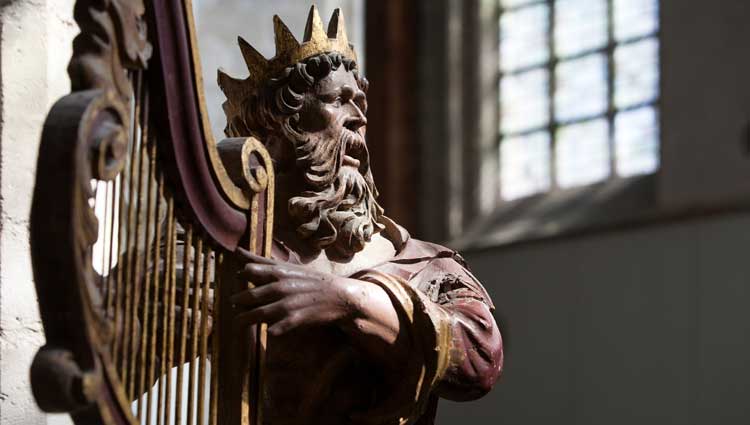You know the Bible has a lot to say about money and generosity. But did you know it also records some of the earliest planned gifts?
A Bequest to Build a Temple
One story, about perhaps the most famous of all planned gifts, is told in I Chronicles 22 and 28. God would not allow King David to build his temple, but told him that his son Solomon would build it after David’s death. In anticipation of this great construction project, David accumulated immense quantities of gold, silver, bronze, precious stones and exotic woods. Then, knowing he was serving a higher power, he bequeathed those assets to his son Solomon, along with God’s instructions for the design of the temple. (Even in Biblical times, donors were particular about how their planned gifts could be used …)
The result of this very early planned gift is known as The First Temple — a holy place where God’s people would go on to worship for many generations to come!
A Last Will & Testament … in 970 BC
While King David prepared his Biblical-age equivalent of an estate plan, he prayed on the assets and plans for the temple. “But who am I, and who are my people, that we should be able to give as generously as this? Everything comes from you and we have given you only what comes from your hand … all of this abundance we have provided for building you a temple for your Holy Name, comes from your hand, and it all belongs to you.” (I Chron. 29: 14 & 16)
What Does Biblical Philanthropy Look Like?
David’s prayer sets the Biblical foundation for all philanthropy. Since we are God’s creation, and all we have comes from Him, we don’t really “own” anything — it all belongs to God. Our philanthropy, then, is really stewardship: We are using the gifts provided by God to lift up His people, both during our time on this Earth and after.
You Can’t Take It With You
The Bible is full of teachings about wealth, caring for the most vulnerable, providing for our families, and giving to serve God’s purpose. Jesus spoke often about helping others and the need for giving. In Luke 12:16-21, he tells the parable of the man who accumulated a great harvest. “Take life easy; eat, drink and be merry,” the man says to himself. But God informs him he will die that very night, saying, “Then who will get what you have prepared for yourself?”
Jesus proclaimed that by using our gifts to benefit others rather than ourselves, we become “rich in spirit.”
God Loves a Cheerful Giver
“It is more blessed to give than to receive,” Jesus tells us in Acts 20:35. The very proof of that is in the satisfaction we receive in return for our philanthropy — a feeling that greatly outweighs the gifts given.
The Apostle Paul, in his second letter to the Corinthian congregation, encourages generous giving because it brings generous blessings in return. “God loves a cheerful giver,” he writes. (II Cor. 9: 6-8). Today, multiple scientific studies confirm what Paul already knew: The joy of giving leads to greater self-esteem, better health and a longer life.
The Most Generous People on the Planet
Americans are probably among the most generous people on earth. Philanthropic giving in the United States — both on the corporate and individual level — is a multibillion-dollar enterprise.
That kind of generosity is truly a blessing. However, when we look at it in Biblical terms, we’re falling far short! It turns out, we’re only giving approximately two percent of our wealth to charity, in annual and planned gifts combined. That’s quite a bit short of the 10 percent we’re instructed to give in Leviticus 27:30.
In 2007, philanthropic Americans contributed more than $300 billion to both secular and religious causes. In 2020, they gave about $450 billion. Yet the gross domestic product (GNP) for the same years was $13.8 trillion and $20 trillion, respectively.
If we had gifted 10 percent of our income and estates in 2007 alone, that would have been a $1.38 trillion boon for philanthropy. Just imagine all the good that could have been accomplished! Imagine all the joy, all the benefits, that would have been returned to the givers!
Let’s follow the example of King David, the teachings of Jesus, and the advice from modern science: Let’s be cheerful givers, and in so doing, give glory to God.


